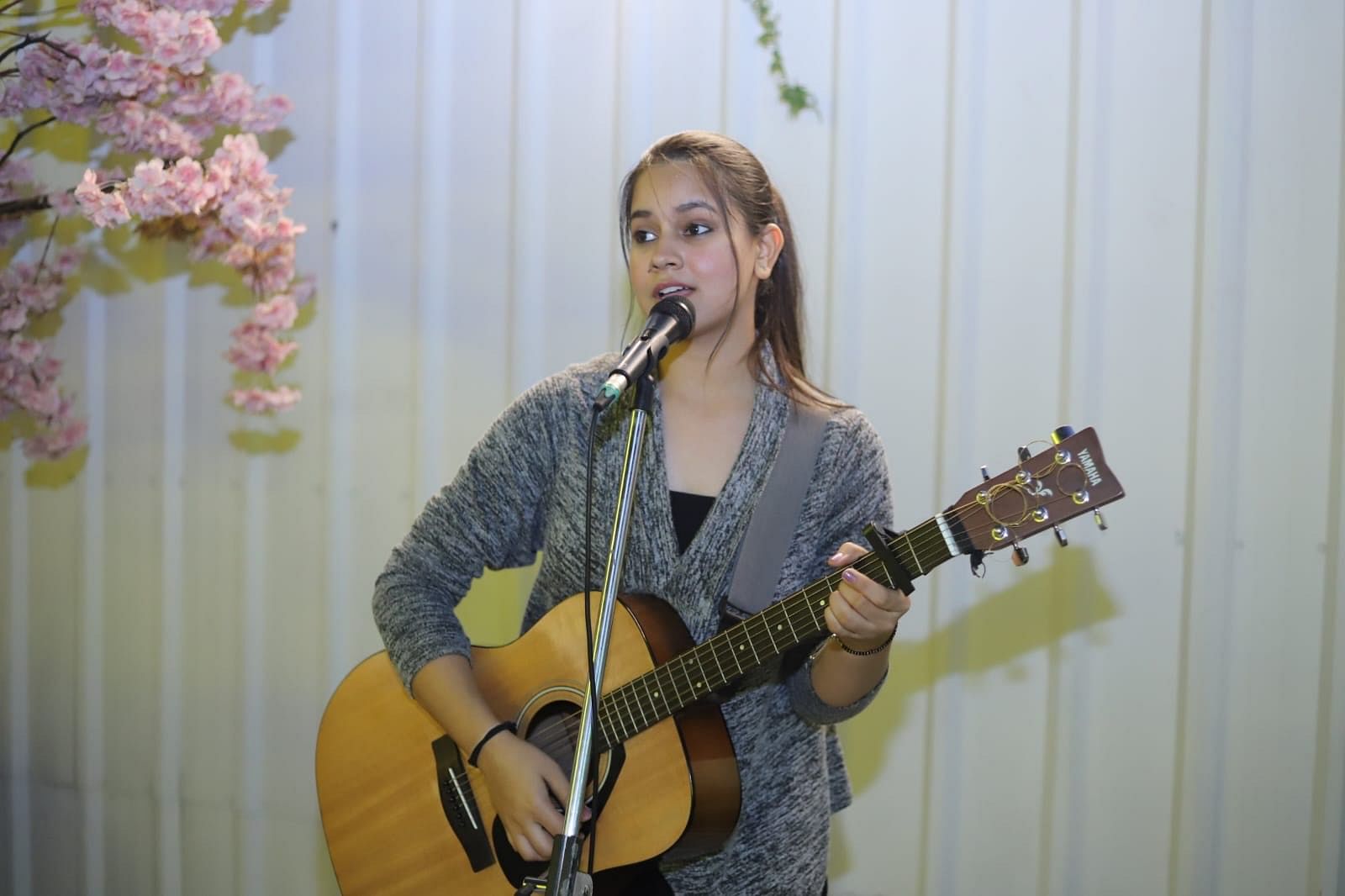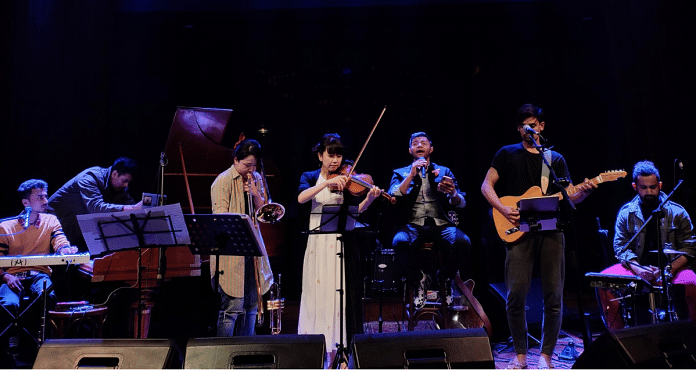New Delhi: After six years as a struggling artiste, Chochung Dema, a songwriter and singer from Arunachal Pradesh, now works as a regular performer at The Piano Man Jazz Club in Delhi’s Safdarjung Enclave. It’s an enviable position at the popular watering hole, famous for its live performances. Dema sings and performs unhesitatingly, free from worries about sexual harassment and prejudices coming her way.
But not everyone is as lucky as Dema.
Most women artistes in Delhi, often performing in dimly lit spaces full of crowds staring on, have to put up with the pitfalls and perils of prejudices against them. It’s an uphill solo battle — especially for those who do not belong to the city.
Also read: This Korean man grew up to be a Bihari. Now his next goal is…
A Delhi problem
It all started when more and more pubs and cafes in Delhi NCR started cashing in on ladies’ night special performances by opening their venues to female performers. Every weekend, strains of music filter out of restaurants at CP — but the playing field is uneven with the odds favouring male artistes.
Safety concerns, sleazy patrons, unsupportive families, meagre pay, rigid landlords, and judgemental relatives are some of the hurdles women singers and musicians face in Delhi.
A tenacious few like Dema and performer Tanya Nambiar, 36, have stuck around to become well-known names, but many talented ones fall to the wayside.
Parents don’t want their daughters performing at night—least of all in Delhi, where stories of attacks on women make headlines almost every day. It’s one of the reasons why Nitisha Sood, a postgraduate student at Delhi University, hasn’t told her parents (who live in Vijay Nagar) about her budding career. She lives in a paying guest accommodation in North Delhi and often performs at live gigs in Connaught Place (CP) and Hudson Lane, accompanied by her boyfriend.
“I am just starting out. We have a PG deadline, and on occasions when I manage a night out, it can be scary to return at 12:30 am,” says Nitisha.
In Delhi, harassment outside pubs during closing time, especially on weekends, has become fairly common. That is why female performers and club owners are wary of late-night gigs over the weekend, despite Saturdays and Sundays being the biggest crowd pullers.
“We do not have bouncers, and there is a concern that getting a female performer on a crowded weekend might end up being an issue if someone is being rowdy and we are not able to provide adequate help and protection,” says a pub owner in CP.
Pragnya Wakhlu, 39, a Dadasaheb Phalke Award-winning Indie musician from Kashmir, has a checklist when she performs in Delhi. One of her priorities is adequate security at venues. “Maybe arrive early and stake out the place,” says Wakhlu.
Moreover, not everyone can afford to refuse a gig. Besides financial constraints, artistes need to maintain public visibility. Out of sight would be out of mind.
Weekdays seem like ‘safer’ options to most, especially if the events are slotted for afternoons or evenings, so women performers can reach home at a ‘decent’ hour and probably not garner as much criticism as they would by performing at night.
Nambiar recalls a 2011 incident in Hauz Khas Village when she was just starting out. On a crowded karaoke night, a man groped her in the dimly lit space. She immediately raised an alarm — to deaf ears across the club.
“Even my brother was performing with me. The owner’s response was not to take the name of the place so that their reputation is not ruined,” she adds. The police, too, put up a callous attitude, saying it was “just groping” and not rape.
It is no surprise then that female artistes are always on alert — even when they’re performing.
“I was performing at a place in Punjabi Bagh when a man, probably a friend of the manager, kept interrupting me. Finally, the manager asked me to perform on the terrace instead of the dining area,” says Nishtha Vishuja, 24.

In private parties, the interruptions are more frequent and avoiding them more difficult. “People come to the mic while drunk and take it and sing even if they are told that they should not go up to the stage. Because the host doesn’t want to look impolite, he might not say anything,” says Wakhlu.
And amid all the bitter experiences, the women artistes’ growth takes a beating.
While some take the liberty to be rowdy with a woman performer on stage, many are so removed that they barely interact at all — the feedback given is dull, non-engaging, and non-stimulating. And no matter how hard you try to build a rapport with the audience, the ‘woman factor’ always comes in the way. “Men can crack jokes about anything, from relationships to drinking to sex. But if you do the same, there is an immediate profiling of you,” says Mansa Pandey, a performer who wrote the lyrics for the 2022 film Charlie 777.
Also read: 80 years of qawwali in Bombay cinema — one man is archiving Hindi music’s…
Making ends meet
The glamour of the spotlight, stage, and cheer from the audience might seem attractive, but for women artistes, it’s often underlaid with little support.
Nambiar started out nearly a decade ago as a karaoke singer; her brother used to perform live in Gurugram and Delhi. Her music evolved over the years — she now incorporates elements of jazz, blues, and pop. But popularity doesn’t guarantee financial security, so Nambiar supplements her income by working as a voiceover artist and event anchor.
“You cannot really survive solely on doing live gigs. You have to branch out,” she says. “Meeting rent [and] food [needs] and surviving in a metro city can take a toll when one is not paid enough. You are constantly worried about where your next cheque will come from and how much it will bring.”
In 2022, Vishuja decided to try her luck at singing at Cantino, a popular cafe at Hudson Lane that used to have all-day live music performances. Her first tw0-hour performance earned her Rs 2,500. Until then, she had been singing for free for two years. And that is how most live artistes navigate opportunities — they perform, record, and share their portfolios with various cafe managers.
Today, she earns Rs 5,000 per performance. Now Vishuja can take some time off too, whereas earlier, it was a week-long hustle to make ends meet.
Besides lack of safety and rowdy audiences, constant stereotyping continues to haunt artistes.
“People think you are a free-spirited person just because you are an artiste. They think anyone with coloured hair must definitely be doing drugs, [or is] into drinking or sex,” says Wakhlu.
Managers and proprietors, too, are often guilty of perpetuating these stereotypes.
“Sometimes, I am asked [by organisers] what outfit I am going to be wearing, or [told to] wear a [particular] dress. I now firmly shut them out. I wear whatever feels comfortable, and even if it’s a dress, I choose what kind,” says Nambiar.
Taking the first step
On the flip side, some venue owners and managers have actually tried to bring about change.
Cafe 27, a popular destination for music lovers in Kailash Colony, has now become a safe haven where a large number of women perform and enjoy a drink by themselves while listening to good music. This was made possible after Shabad Mehta, the owner of the cafe, enforced a filter mechanism for guests.
“We do not allow stag entry unless they have been regulars and we know them enough. The idea is to provide a good musical experience for our customers,” he says.
Cafe 27 started live gigs in 2010 and decided to promote upcoming talent by providing them a platform.
And The Piano Man Jazz Club, too, takes the same approach.
“We approach any untoward situation in the bar [with] a zero violence [policy]. Our policy stems from the understanding that the artist is the most important person in our space,” says Arjun Sagar Gupta, the owner.
The concept bar is known for its musical events and for relatively better pay too. “Usually, if you are paid Rs 15,0000 as a band, it will be split among 4-5 people maybe. That is barely any money. Piano Man is one of the few places that pay everyone equally. Each performer gets a fee,” says Nambiar.
From ensuring that the audience interacts with the artist in a healthy manner, conducting workshops on music to encouraging more women to participate, The Piano Man Jazz Club takes the initiative to have newer talent on the stage. Even salaried performers aren’t made exclusive to the bar so that they can perform in other places too.
“There needs to be a change in mindset. At our place, we have the concept of ‘silent song’ where we stop bar service and don’t allow conversation. It reinforces the bond between the artist and the audience,” says Gupta.
At Teo in Punjabi Bagh, Nishtha has a mixed crowd swaying to her music on a Saturday evening. Despite the oppressive Delhi heat, people cheer her on and give a resounding applause every time she finishes a song. A group of friends also start grooving to the beats. She smiles and nods.
(Edited by Humra Laeeq)



